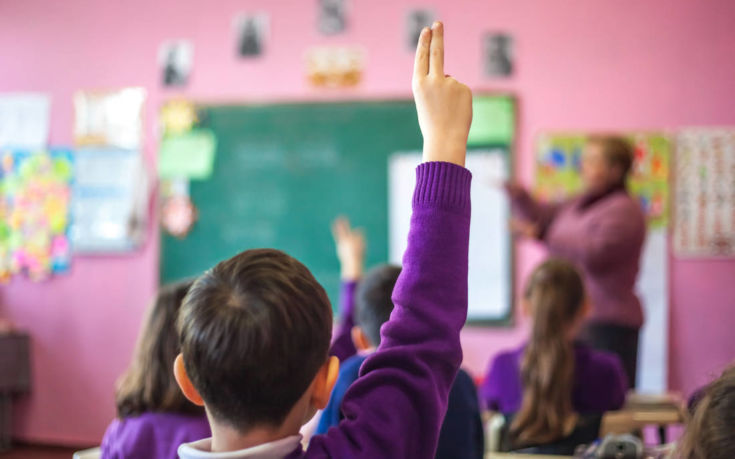Learning difficulties: dyslexia, dysnumeracy, dysgraphia. They affect a fairly large percentage, about 5% of children, and significantly affect school performance, which is lower than expected. Many may have heard of them but do not know many details. Others ignore them completely and unjustly rush to characterize a student as lazy or negligent.
Problems appear not only in school but also in everyday life. The people who present them, however, often have very high intelligence. A typical example is Albert Einstein.
Shortly before the schools open, the child and adolescent psychiatrist, Maria Papadimitriou, analyzes the precursors "signs" of learning difficulties, their causes and the ways of treatment that all parents should know.
- To start with dyslexia? What exactly is;
Dyslexia is the so-called reading disorder that is the most common. In dyslexia we have a deficient ability to recognize words, a slow and inaccurate reading and a lack of overall understanding of what one is reading. Dyslexia is not just about school. It can be said that an adult takes a manual of a device and can not understand all the information he reads, someone must also explain it orally. In 40% of these cases there is heredity.
- What are the signs that if parents notice they should consult a specialist to determine if the child has dyslexia?
The child can read syllabically. Whatever he reads, he can not easily render it afterwards, he has difficulty, he stops, he gives up and he does not want to continue. There are problems with recognizing words in writing while in elementary school it is difficult to match pictures with words. Children with dyslexia have spelling problems which are often paradoxical, ie at one time one word may be spelled correctly and the other incorrectly. Adults often misunderstand all this and attribute it to laziness or think that the child is doing it on purpose. Still, it is possible that there is a huge reaction of the child regarding the reading, which does not suit his personality and character. Many parents say "our life has been hell since school started".

So parents from kindergarten and elementary school understand these suspicious signs. Which specialist should they turn to?
The pediatrician is always a point of reference and will guide the parents appropriately if asked. But a multifaceted assessment is needed. The child should be seen by a clinical psychologist who will do a test that allows us to see overall how his brain works. It should also be seen by a specialist educator-school psychologist and then a child psychiatrist. Most of the time, in addition to the child's learning intervention, he also needs parental counseling.
Care is needed because there are various treatment centers of dubious quality where some kind of evaluations are made and then diagnoses from the first grade. We should know that the final diagnosis can not be made before the third grade, a specialist can not say with certainty, how serious this disorder is earlier.
- And what happens after the diagnosis? Is learning disability curable?
The final diagnosis helps us to give this child the ability if there is a learning disability and we now know its importance to have specific ways of evaluation and examination in high school and high school.
- How is a child with learning difficulties examined?
In elementary school, the teacher gives more importance to the oral and chooses appropriate pedagogical ways so that whatever is written in the exam, can be supplemented in appropriate oral ways. Other children, of course, may just need more time to examine.
In high school, the oral grade counts much more. However, the writing does not stop because the child works on his difficulty. It is never cured but will not stand still over time. We have cases in high school where teachers do not even realize that there are difficulties precisely because these difficulties have been "worked" properly and are not perceived.
In Panhellenic, the children write together with the rest of the examinees and at the end, they stand in front of the teachers, solve the issues orally again and the teachers take notes.
- The second learning difficulty is numeracy. Want to tell us a few things about her?
It is the disorder of mathematics. The children here, they have difficulty learning and retrieving numbers. They can not remember simple mathematical operations, they have a very slow pace in calculations and they make and can make mistakes even in addition. We also have difficulties with both language and perceptual skills, that is, recognizing and understanding symbols. There are also issues with concentration.
- And what other learning disorder is there?
There is also the disorder of written expression which is more rare, formerly called dysgraphia. It mainly concerns the deficiencies in the use of language and is more difficult to detect. We are talking about children who have bad spelling, grammatical errors, punctuation and very bad graphic character. It takes a long time for these children to start writing texts and there is a very poor organization of the text. It is difficult to make a final diagnosis before the age of seven, usually after ten years. From the beginning of the second grade, teachers usually understand that there is a problem. It is also valid here that in the third grade we put the final diagnosis.

- Where are the learning difficulties due? Do we know what their causes are?
The etiology of learning disabilities is not clear. What is certainly happening is that in some areas of the brain related to speech with written expression and mathematics there is a different type of brain morphology. We are not talking about a pathology, there is no lack of production of a substance as is the case with some diseases or there is no lack of an anatomical element.
People with learning disabilities are faced with the "way of many". The education system is built for many and in this system children with educational difficulties can not respond easily even though most of them have an IQ higher than expected.
- Is it true that Einstein also had learning difficulties?
Einstein had severe reading disorders. Bill Gates has a very serious disorder and so did Steve Jobs. And it is no coincidence that all these people were engaged in things outside of "reality" and everyday life that were closer to the way their own brains functioned. What is required with her learning difficulties is for the child to have the appropriate framework so that he can show his abilities. These children excel and often, are above average.
- So they have some specific slopes?
They have a very developed ability to place things in space, so many times you have a second grader who can and does understand geometry better, say, than a high school senior. Or you see children who can and do orient themselves very well in space or paint exceptionally or have excellent synthetic thinking skills. They can make up a story, tell it to you or reproduce a story in a way that does not suit their age and level of knowledge.
- Many times children with learning difficulties are misunderstood unfairly, those who do not know what is happening may consider them negligent, indifferent to the lessons.
It is the usual thing you describe, they can be considered lazy, indifferent, reactionary, some people unjustly say that they are not going to achieve things in their lives. Many times the parents come to us asking for help and want us to cure the "bad child", to bring him to the "straight path". Learning disabilities are often accompanied by some purely psychiatric disorders because a child who fails to integrate feels that others do not understand but also that he does not understand others. The child who is in the classroom and does not understand what is happening, not only suffers the same but understands that others have difficulty because he does not participate.
- What feelings do these children develop in awkward situations?
These children often have a lot of anxiety, are discouraged from having low self-esteem and self-image. To experience a frustration that lasts for years, if not diagnosed, to have bad relationships with their interlocutors. Especially in elementary school, being a bad student is unfortunately a "stigma".
